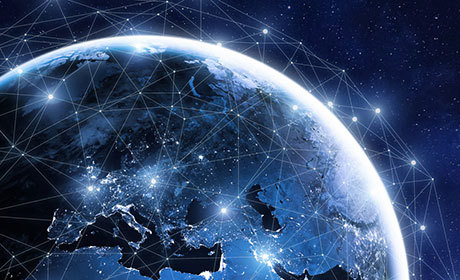For decades, globalisation has transformed the world we live in, with countries becoming more interconnected. But a number of events in recent years have loosened those bonds and, in some cases, stretched them to breaking point. Helen Bradshaw asks whether protectionism and a focus on resilience is putting an end to globalisation.
Helen Bradshaw explores

Globalisation has been one of the most overarching economic themes of the last few decades. Countries around the world embraced this trend, lured by the ability to exploit their competitive advantages in specific industries. Partnerships were developed to promote trade, helping to boost economic growth globally. In 2001, China became a member of the World Trade Organisation (WTO) and started to manufacture for the world. Consequently, more people than ever before became members of the ‘middle class’, with large boosts to living standards, particularly in developing countries.
Meanwhile, developed markets benefited from the lower cost of manufacturing in overseas hubs. Many industries moved production offshore, reducing costs by using cheaper labour, allowing both companies and consumers to benefit. Any concerns that this approach would put large swathes of people in developed markets out of work were largely swept aside, and very little time was spent focusing on the challenges that globalisation might bring.
Shifting viewpoints
Following a sustained shift towards a more global and interconnected world, it is becoming more and more clear that the benefits of these changes have not reached everyone equally, resulting in a turn towards protectionism in recent years.
While globalisation creates many job opportunities, it may also lead to job losses in high wage developed markets when companies offshore their production.
Understandably this contributes to more insular and protectionist views among those negatively affected, and in recent years has culminated in several notable events. First there was Brexit, which many envisioned as an opportunity to protect and promote UK home-grown business and trade.
Next we saw the election of Donald Trump as US President, with a rhetoric to ‘make America great again’. The result was a ramping up of the trade war between the US and China.
Many believe these events were driven by economic and social inequality that resulted from having a more open economy with competition from abroad. Governments have started to acknowledge some of the inequality. In the UK, the recent ‘levelling up’ campaign has focused on regenerating areas of the UK outside London and the south-east. While globalisation has benefited the UK overall, the benefits have not been spread evenly leading to regional disparities.
Continuing pandemic fallout
More recently, the pandemic highlighted the pitfalls of globalisation, or more specifically “just-in-time” supply chains. As countries around the globe locked down, manufacturing production in some regions stalled. The breakdown in globally synchronised production resulted in bottlenecks and shortages of particular items; companies and industries became acutely aware of their dependency on inputs from other countries. Consequently, many companies considered ‘onshoring’ – moving their operations from overseas back to a domestic location. Indeed, many governments also responded with protectionist measures, further seeking to prioritise their own countries.
Geopolitical uncertainty
Russia’s invasion of Ukraine has put further strains on globalisation. As relations between Russia and the West sour, it has highlighted the risks of this interconnected economic web and will likely accelerate the de-globalisation trend.
The sanctions imposed on Russia demonstrate that trade is the new weapon of choice, but it’s not just Russia that will be affected – collateral damage will occur too.
This is the reason for European reluctance to sanction Russian energy. Europe gets about 40% of its natural gas from Russia, which is also the bloc’s main oil supplier, with some countries more dependent on Russian fossil fuels than others making unity on any proposed sanctions more difficult. Conversely, the US imports little oil from Russia and so was more willing to enact a ban.
The EU now plans to reduce Russian gas imports by two-thirds this year but expected shortages have driven power prices higher and higher. This means more household income will be spent on energy bills, diverting spending from elsewhere in the economy.
As well as an increased focus on energy security, concerns over food security are also coming to the fore given Russia and Ukraine export around a quarter of the world’s wheat. While the EU is trying to reduce reliance on Russian energy exports, the UK may look to produce more food domestically. However, these decisions come at a cost, likely in the form of higher prices, at a time when the cost of living is already at a 30-year high.
Opportunity or risk?
Time will tell how things develop. Whether we see a stall in globalisation, or indeed a continued move away, the path ahead is likely to be different, and perhaps less predictable. But as with any market shift, this will create opportunities for countries and companies that are willing to adapt.